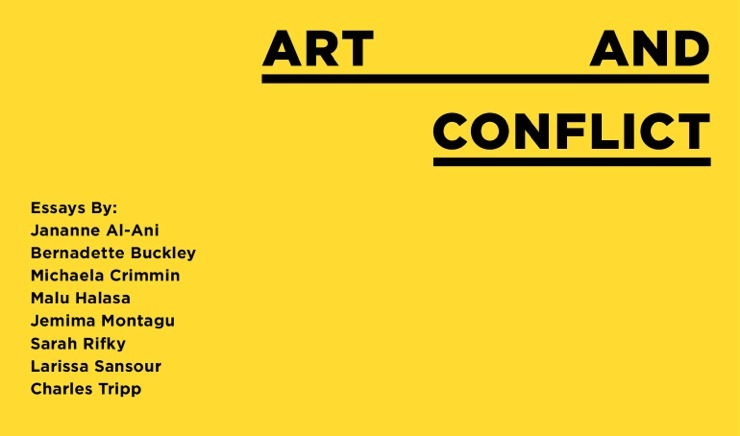12 Nov 2014 | Religion and Culture, United Kingdom

Art and Conflict is the result of a year-long research enquiry, supported by the Arts and Humanities Research Council, exploring the extraordinary work of contemporary artists, activists and cultural organisations in the context of armed conflict, revolution and post-conflict.
Bringing together a diverse range of perspectives, Art and Conflict aims to raise provocations and open up conversations within the arts, as well as across sectors and disciplines.
An introduction by Michaela Crimmin (Royal College of Art and co-director Culture+Conflict) precedes specially commissioned essays and texts by artist Jananne Al-Ani; Dr Bernadette Buckley (Goldsmiths, University of London); writer Malu Halasa; curator Jemima Montagu (co-director, Culture+Conflict); curator Sarah Rifky (Beirut, Cairo); artist Larissa Sansour; and, Professor Charles Tripp (SOAS). Two further essays by Michaela Crimmin and Dr Bernadette Buckley reflect on art and conflict in Higher Education in the UK.
A free download of the online publication is available here:
Art and Conflict
Art and Conflict
Edited by Michaela Crimmin and Elizabeth Stanton
Design by Tom Merrell
Published by Royal College of Art, London, 2014, with the support of the Arts and Humanities Research Council.
The Art and Conflict research inquiry was realised as a partnership with Index on Censorship, with additional support from the British Council, Culture+Conflict, the University of Manchester, and Goldsmiths, University of London.

12 Nov 2014 | Events

In the 1980s, Stewart Brand declared that “information wants to be free”. The phrase became a slogan for technology activists, who argued that tech can liberate information from expensive patents and help further the ever expanding limits of human knowledge. As a part of the BBC Radio 3 Free Thinking Festival, Rana Mitter tests the promises of the internet to spread ideas quickly and democratically. Catch up online with this event featuring:
- Dr Rufus Pollock (Founding President of the Open Knowledge, an international non-profit organisation that promotes making data and information accessible)
- Jodie Ginsberg (Chief Executive of Index on Censorship)
WHERE: BBC Radio 3
WHEN: Thursday 20 November 2014, 10:00pm (then on iPlayer)
TICKETS: Listen live here
12 Nov 2014 | Azerbaijan, Events
For six months, Azerbaijan has been chairing the Committee of Ministers of the Council of Europe, Europe’s top human rights body. During that period, Azerbaijan unleashed an unprecedented crackdown against civil society—including the imprisonment of human rights defenders and political activists who criticised the government.
Today, as the situation for human rights keeps deteriorating in the country, Azerbaijan is getting ready to host the first European Olympics.
Index on Censorship, Platform London and others will be holding a peaceful demonstration in front of the Embassy of Azerbaijan, 4 Kensington Ct, London W8 5DL on Monday 17 November 2014 at 5.00 pm.
Join us this Monday to denounce the crackdown on civil society and call for the release of all political prisoners in Azerbaijan.
Platform will be holding other demonstrations at 5pm everyday that week.
- Tuesday: 18 November BP’s HQ – 1 St James’ Sq – 5pm
- Wednesday: 19 November – Uk Foreign and Commonwealth Office on King Charles Street – 5pm
- Thursday: 20 November – the European Bank for Reconstruction and Development, 1 Exchange Square (by Liverpool st) – 5pm
- Friday: 21 November – the International Olympic Committee – 60 Charlotte Street
For more information, please email Melody Patry, Senior Advocacy Officer, on [email protected] or call on 0207 260 2660.
12 Nov 2014 | Draw the Line, Young Writers / Artists Programme
The right to vote has long been a symbol that you are seen as a valuable and worthy citizen by your government. The removal of this right is a restriction on your free expression and your ability to contribute to change in your country. But is restricting our right to vote a violation of free speech?
In the recent United States midterm elections there was controversy over the Republican’s use of voting restrictions to prevent groups — who they assumed would vote Democrat — from access to the polling station. The voter ID “fraud” laws have been accused by liberals as a shady measure to attempt to reduce voting by racial and ethnic minorities. It would also affect young people who lacked the supposedly necessary identification.
Voting age is another example of an ongoing debate surrounding this issue. Sixteen-year-olds were allowed to vote in the Scottish referendum earlier this year. Since then, people have questioned whether the voting age should be reduced to 16 for the upcoming UK general election, and whether sixteen year olds are capable of making a well informed decision. And if voting is an act of free speech, does this mean prisoners should have the opportunity to vote? If voting is truly a human right should we all have the right to vote?
This article was posted on 12 November at indexoncensorship.org




![By Rama (Own work) [CC-BY-SA-2.0-fr (http://creativecommons.org/licenses/by-sa/2.0/fr/deed.en)], via Wikimedia Commons](https://www.indexoncensorship.org/wp-content/uploads/2014/11/2048px-Election_MG_3455.jpg)